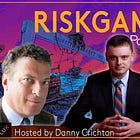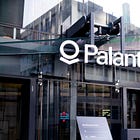Open secrets harm society far more than AI or disinformation
The lies we tell each other are what undermine reality
A quick housekeeping note: Tonight’s Riskgaming runthrough in NYC is very, very sold out. I am so sorry to the several dozen folks we can’t get off the waitlist. But, the themes of tonight’s event are the inspiration for today’s piece, and I hope we can find another time to play Laurence’s game so everyone can join.
Years ago, I was working at a leafy government agency that tries to keep things, well, quiet. I show up at headquarters one day, and I’m told we’re going on a field trip to one of the most classified installations in the country. I’m directed to get in the waiting black van with tinted windows. Either I’m about to see something really cool, or I’m about to be murdered. In other words, it’s just another day at the office.
We visit the installation, and upon our return, we are pre-reprimanded not to discuss any aspect of the facility or its location whatsoever. So I do what any naturally curious person would: I go to Wikipedia and search for the town near the installation. Lo and behold, linked in the first paragraph is a full article on the very installation I was just told shouldn’t exist.
I remember sitting there bamboozled. The dissonance between the über-secrecy — the hushes and the warnings and the threats of punishment — and the reality that everything I had just seen was clearly documented on one of the most trafficked websites in the world was way beyond my doublethink capabilities. It was an open secret, one that I was expected to pretend wasn’t open.
Some time later, in late 2010, Julian Assange and his team at WikiLeaks dumped an extensive cache of American diplomatic cables. The action prompted a ferocious debate — one that only reached its denouement last year. I read a bunch of the cables, most of which were the anodyne missives of mostly-ignored frontline officials in countries no one in DC cares about. But a few were interesting, and I tried talking about them with a friend holding a security clearance. He told me he had been strictly instructed not to read the cables, since that would violate his clearance.
I said, “they’re on the internet and being discussed on cable news.” He had apparently been instructed to change the channel if the cables were being read on television. I thought he was being ridiculous, but then I read such coverage as this contemporaneous article from The New York Times:
State Department employees have confided that they read leaked cables on newspaper Web sites at home rather than risk trouble by viewing them at work. A Times reporter who appeared with a State Department official on a recent panel was advised not to show leaked cables as slides — the official was prohibited from looking at them.
Maintaining open secrets like these requires a passive conspiracy of lies. We know the empirical truth, but we can’t express it nor can we act on it. It anesthetizes agency, because humans don’t like living inconsistently with the world as they perceive it. That is deeply corrosive to political debates, corporate strategy meetings and anything in between — open secrets are the landmines in the march to rigorous thinking.
Last week, Immigration and Customs Enforcement agents raided a battery facility in Georgia, arresting more than 300 South Korean nationals at a plant under construction by a partnership between Hyundai and LG Energy Solution. The operation included an astonishingly aggressive perp walk suited more for drug kingpins than run-of-the-mill construction workers and project managers. Unsurprisingly, the Korean press blistered with anger over the raid, and the U.S.–Korean alliance went into a tail spin after a productive state visit at the White House just two weeks ago.
Nearly all politicians — even the most nativist and populist — ultimately care more about economic growth than the composition of the American workforce.
We don’t know how many of those arrested were doing work outside their formal visa restrictions. But it’s an open secret that companies generally flout U.S. immigration law when it comes to expert project work like building battery and semiconductor facilities. As reporters for the Financial Times wrote earlier this week:
Because short-term US work visas can take weeks to be issued, some South Korean companies have sent staff under a visa waiver programme to help install new equipment and supervise construction, according to people familiar with companies’ operations.
Like all open secrets, this is a recurring pattern. A few years ago, TSMC struggled to secure visas to bring in Taiwanese construction workers for its Arizona fab facility, fighting members of the local pipefitters union who wanted the work for themselves. Was it pay, expertise, cultural affinity, discrimination, expediency, or just defaults that pushed TSMC to fight? Or all of the above? Does it matter?
The government knows what’s taking place (that’s why officials were able to conduct the raid in Georgia in the first place). Political leaders have passively allowed businesses to flout immigration law for decades in a you-see-me-I-see-you conspiracy of lies. A conspiracy so consistent, businesses have come to rely on lax enforcement and weak interpretations to underwrite their commercial plans. Why does it all work? Because nearly all politicians — even the most nativist and populist — ultimately care more about economic growth than the composition of the American workforce. We’re all playing under the same incentives, and everyone acquiesces.
Kelsey Piper, in the recently launched left publication The Argument, dubs this “the honesty tax” in the context of benefits fraud and land-use controls. “If the rules are widely ignored, it’s probably because the rules are badly designed,” she writes. “We allow widespread rulebreaking as a workaround in place of actually fixing them. But while rulebreaking might be better than enforcing stupid rules, it’s a lot worse than changing them.”
She’s right about changing the rules, but that’s the challenge with the incentives of open secrets. Leaders want both the outcome and the lie. They want to message populism while also quietly welcoming the overseas construction workers who are necessary for the wealth generation that ultimately drives their poll numbers. They want to accept the accolades of promoting an ethical technology framework while also maximizing revenue regardless of the consequences, say, teen suicides (incredibly, this describes more than one tech company in the news this past week).
The spooks are now the ones trying to lead us away from the very wilderness of mirrors they once built.
The downside of being trained as an engineer is that I find it hard to ignore the incongruities between open secrets and reality. Engineers want to fix things, and we’re really good at error analysis. When we turn that lens toward social systems, we feel profound anguish in realizing that the system is fundamentally broken and needs immediate maintenance. For us, passivity toward the conspiracy of lies becomes all the more intense as we realize that no maintenance is forthcoming — the rules are locked.
Yet there is an upside as well. Seeing the truth of a system is its own superpower, a superpower that I share with others through Riskgaming scenarios. There are many relevant quotes that connect to Riskgaming, but one of the most fundamental would be cyberneticist Stafford Beer’s constant refrain, “the purpose of a system is what it does.” I would argue that the majority of insights from our scenarios fall into this category. Dispel the open secrets, burn down the conspiracy of lies, and start to have a free exchange about reality as it is. After all, that’s how one navigates toward the valuable contrarian-but-correct quadrant of the venture capital investment matrix.
Open secrets ultimately degrade all contexts — just ask the intelligence community. I was recently talking with a senior intelligence leader about the threats that keep them up at night. This individual said “the Cartesian crisis,” or the inability of citizens to distinguish between reality and fiction. I sort of stared, gobsmacked, realizing that the spooks are now the ones trying to lead us away from the very wilderness of mirrors they once built.






